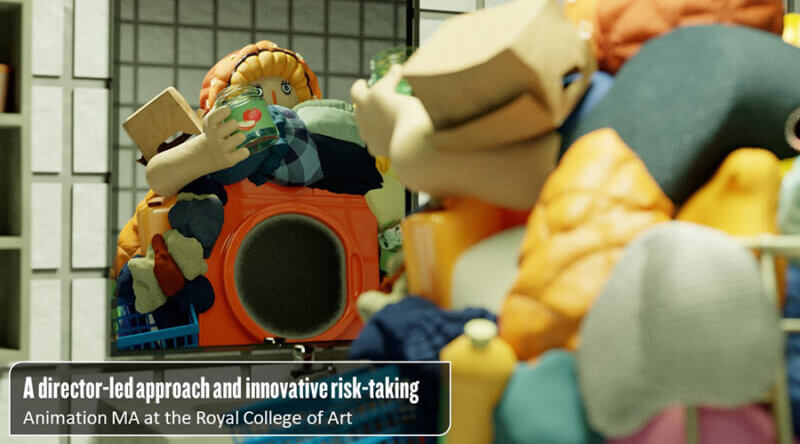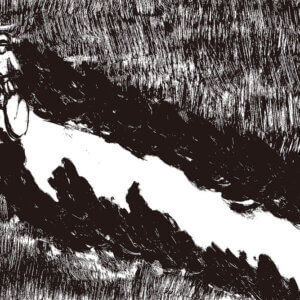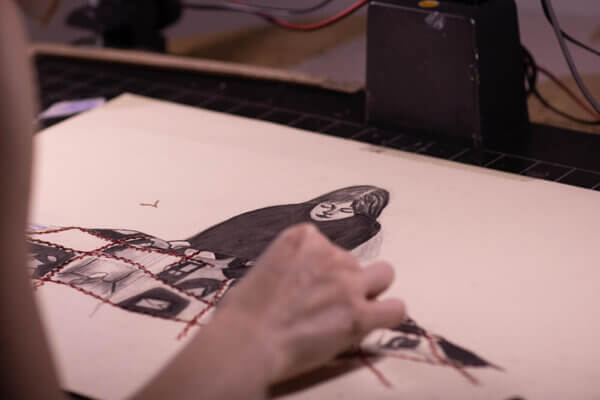 Sponsored Article
Sponsored Article
A director-led approach and innovative risk-taking: Animation MA at the Royal College of Art

The Royal College of Art (RCA) produces an impressive number of award-winning animations. From Oscar nominated The Ice Merchants (2022) by João Gonzalez, to Anna Mantzaris’ Enough (2018), which won over 30 international awards, and Mikey Please’s BAFTA winning The Eagleman Stag (2010). Graduates of the College go on to establish their own studios – like Parabella Studio – or work for big names in animation, from Aardman to Studio AKA. It is little surprise that Animation Career Review recently ranked the RCA as number 8 university in the world for studying Animation. So just how does this programme, from a small specialist art and design university, nurture such impressive graduates?
Based in London, the RCA is the world’s largest community of postgraduate-only art and design students. For ten consecutive years, it has been ranked as the world’s number 1 university for art & design [by the respected QS ranking]. Students studying Animation work alongside designers, artists, communicators and architects from around the globe – each drawn by the excellence of the College and reputation of its alumni. They are surrounded by peers as intent on making an impact as they are talented.
In this diverse, multidisciplinary environment, the Animation MA programme encourages experimentation and creativity. This is underpinned with critical thinking. Individuals are supported in developing their artistic excellence, through a director-led approach and innovative risk-taking.
“The RCA has run an Animation MA since 1985, almost 40 years”, explained Head of Programme, Dr Samantha Moore. “It has produced an incredible number of animators and directors and is a touchstone for artistic director-led animation. We give students the opportunity to immerse themselves in all areas of the form, and to think about the way that they position themselves as practitioner-researchers.”
Students come to the programme from broad backgrounds, and explore an equally wide range of approaches to animation; from the intersections of virtual reality, augmented reality and new media art, to traditional forms of the medium. “The RCA Animation curriculum is incredibly rich and diverse with a programme that includes workshops, lectures, tutorials, guest lectures, feedback from industry, festival trips and industry competitions,” Sam pointed out. “The academic teaching is grounded in the importance of being able to articulate and share ideas and perspectives with others, be that peers, tutors, collaborators or an audience. Communication is key.”
This results in an extraordinarily diverse range of approaches to animation, both in terms of methods and the narratives conveyed. Students are currently working towards their final graduate films. These will be presented at RCA2024: The Festival of Communication – a series of events and exhibitions showcasing the work of graduating students from 17 July to 4 August. Projects range from an animist essay/journey film about travelling the Andean mountains by Lucia Lambarri Barberis, to Yuchen Liu’s bitingly satirical stop motion elephant mockumentary about gender-based violence and Lucy Wei’s projection mapped sculptural work about identity and grief. As Sam sums up: “There’s a lot, and it is about a lot. Animation is such a great medium for ambitious artist directors to convey the subtleties and complexities of the human experience.”
The RCA’s director-led approach to animation is supported by academic staff and technical instructors who themselves are practitioners and researchers. Sam – who describes her practice, research and teaching as “irrevocably intertwined” – was nominated this year for a BAFTA for her short documentary Visible Mending (2023). “Animation needs collaboration to make it work best” Sam explained. “So, whatever our area – animated documentary, VR and 360, stop motion, sound, artists moving image, drawn – we have advice to help support your work.”
- Jieting Fang
- Chenmo Wu
- Boeing Li
Often, students come to the RCA’s Animation programme with industry experience, looking to elevate their practice to the next level. Recent graduate, Chu-Chieh Lee, who has had huge success at festivals since graduating, including winning the Tom Berman Award for Most Promising Animator at the Ann Arbor Film Festival, USA, worked in animation for 10 years before coming to the RCA. “The RCA was a chance for Chu to become more proactive in her career, experiment with different techniques and find her artistic directorial voice”, Sam explained. “Her final film, Minus Plus Multiply (2023), is a beautiful tour de force of animation using many different techniques including ceramics, hand drawn 2D, and stop-motion animation. It is tender, beautiful, and heart-breaking, and it came from a deeply personal place.”
Finding your voice at the RCA is a common experience. João Gonzalez described the RCA as giving him creative freedom to develop his artistic voice and Anna Mantzaris said it is where she found her own way of storytelling and learnt to trust herself. This approach pays off. Every year, graduate films from the RCA’s Animation MA programme are showcased to great acclaim on the festival circuit. Just recently, two alumni triumphed in the Annecy MIFA Pitch prizes for short films. Cheng-Hsu Chung won the Ciclic Prize and Jenny Jokela won the Open Workshop Prize to support the development of their current projects.
Another strength of the RCA is its community of students, staff and alumni. “The network that you join when you become part of RCA Animation is a diverse and enormous group” Sam reflected. “Our graduates are international, so they go to all corners of the world. They move into all kinds of animation too: commercial, industrial, independent, and educational. Others make artists’ moving image, exhibit, install, programme, code, or perform their work. We’re proud of them all.”
Applications for the September 2024 intake of the Animation MA are still open, but places are limited. Visit the RCA website to find out more.







